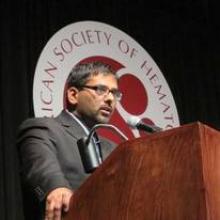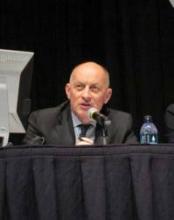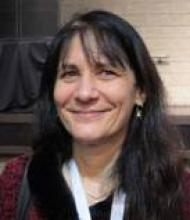ATLANTA – The experimental drug ARRY-520, the first kinesin spindle protein inhibitor in multiple myeloma, prompted responses in nearly one-fourth of heavily pretreated and triple-refractory patients in a phase II study.
The overall response rate to single-agent ARRY-520 was 16% in patients with a median of six prior regimens. It reached 22% when combined with dexamethasone in patients with a median of 10 prior regimens – all but one of whom was refractory to lenalidomide (Revlimid), bortezomib (Velcade), and dexamethasone (Decadron), Dr. Jatin Shah reported at the annual meeting of the American Society of Hematology.
Kinesin spindle protein (KSP) is a microtubule motor protein required for mitosis and separation of the mitotic spindle pole into a bipolar spindle pole. Inhibition of KSP prevents formation of the bipolar spindle, leading to cell death. Preclinical work shows that ARRY-520 also down-regulates myeloid cell leukemia-1 levels, a mechanism for dexamethasone resistance.
The investigators also identified a potential biomarker called alpha 1-acid glycoprotein (AAG) that may predict how well patients respond to ARRY-520.
Selecting patients by AAG serum results increased the response rate to 33% in the combination group, a population with an unmet clinical need, said Dr. Shah of the University of Texas M.D. Anderson Cancer Center in Houston.
"The assay isn’t a fancy test; it can be done actually at any commercial lab," he said in an interview. "The key is to validate that the labs are doing the assay in the same way."
Duration of response noted
Dr. Antonio Palumbo, chief of the myeloma unit at the University Hospital of Torino, Italy, who comoderated the session, said in an interview that ARRY-520 is "certainly an exciting new agent" in multiple myeloma, given its novel therapeutic target, partial responses of 20%-30% in such advanced disease and a potential biomarker.
"I think the biomarker was important and probably also the durability because this type of drug may have a major role in durability, more than on response," he said.
Median duration of response was 8.6 months with ARRY-520 monotherapy (range 1.4-20 months) and 5.4 months with combination therapy (2.5-9 months).
Dr. Angela Dispenzieri, hematologist and professor of medicine at Mayo Clinic, Rochester, Minn., and a member of the meeting’s scientific committee, was more effusive in her assessment of the results.
"Actually, I think it’s the best thing so far at ASH," she said after the session on the penultimate day of the meeting. "It’s novel.
"This is a new class and it actually has single-agent activity. That’s the beginning and that is very important. I was really impressed, and I’m really cynical."
Both Dr. Dispenzieri and Dr. Palumbo said results should be better if ARRY-520 is combined with other agents such as bortezomib, proteasome inhibitors or immunomodulatory drugs (IMiDs).
Preliminary results reported in a poster at the meeting show that one of six evaluable patients achieved a near complete response and four had stable disease after completing at least one cycle of ARRY-520 plus the proteasome inhibitor carfilzomib (Kyprolis), Dr. Shah reported.
"We’re already starting to see a signal there, and we’re going to go with IMiDs next," he said.
A phase Ib combination trial with bortezomib is also underway.
Fifty patients in two cohorts
The current phase II study included 32 patients who received single-agent ARRY-520 at 1.5 mg/m2 on days 1 and 2 every 2 weeks and 18 patients who also received low-dose dexamethasone 40 mg once weekly. Both groups received granulocyte–colony stimulating factor support.
The first cohort had relapsed and/or refractory multiple myeloma after receiving at least two prior rounds of therapy (range 2-19) that included bortezomib and an IMiD. Roughly half were bortezomib refractory (53%) and 41% were triple refractory.
Cohort two had also received at least two prior regimens (range 5-13), but progressed during or within 60 days of their last regimen, was refractory to lenalidomide, bortezomib, and dexamethasone (except one dexamethasone-refractory patient) and had received adequate prior alkylator therapy. High-risk cytogenetics were present in 17% vs. 9% of cohort one.
In cohort one, there were 5 partial responses, 6 minor plus partial responses, and 14 cases of stable disease, Dr. Shah said. The median time to response was 4.4 months and median progression-free survival was 3.7 months. The cohort had very durable responses at a median of 8.6 months (range 1.4-20 months), and an overall survival of 19 months, he said.
In cohort two, there were 4 partial responses, 6 minimal plus partial responses and 5 patients with stable disease. The median time on treatment about doubled from 2.1 in cohort one to 3.9 months, with a shorter time to response of 3.4 months. The median duration of response was shorter at 5.4 months, "but again this was a very different patient population," Dr. Shah said.




